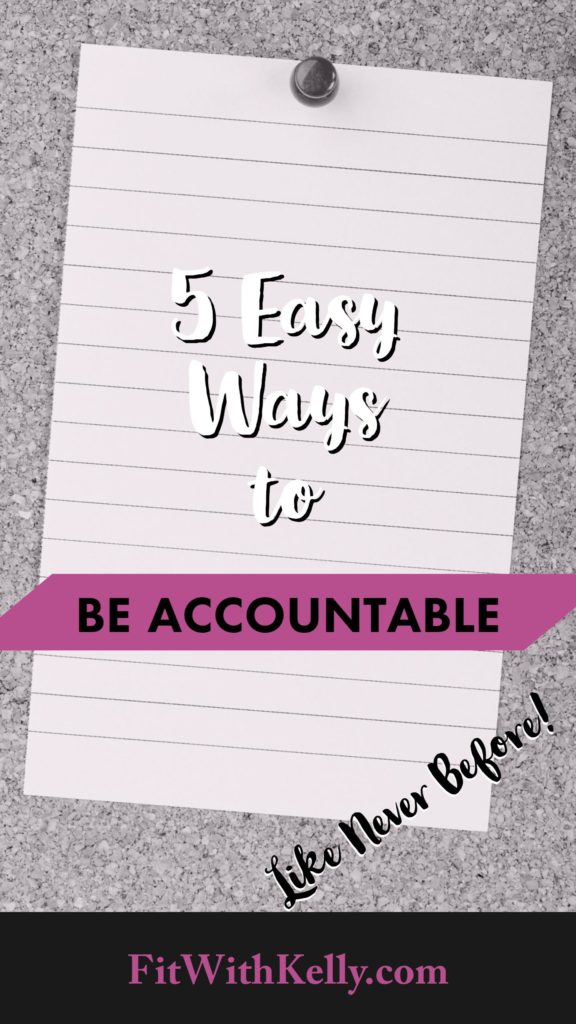5 Easy Ways to Be Accountable to Your Workouts
Like Never Before

You may have been hitting the gym day in and day out for a few months, but then all of a sudden something came up and you stopped going. It's not for a lack of motivation, but life keeps getting in the way and you're not satisfied with the way you look. Even if you feel like you are eating healthy, but you're not tracking your food into myfitnesspal. You might think about doing a workout and might even have a workout plan ready to go, but you don’t have time to workout. Sometimes you want to, and you're motivated internally, but externally you can't seem to make it happen. The result? Your jeans are getting snug. The reality is that without having easy ways to be accountable, it's hard to get around to your workouts.
Before you find yourself in the fitting room trying on a bigger pant size, make a commitment. To get the results you are so desperate to find, you have to work on both your nutrition and exercise. It's a hard reality to face, but even a little bit of gradual change per week can make huge changes in your body fat. You could be exercising to your best ability, but eating back your calories. Or you could be eating a totally healthy diet, but your metabolism isn’t working hard enough to burn fat because you are sedentary.
If you're not doing your workouts consistently, or eating within your calorie budget, you are sacrificing your metabolism. To put it in perspective, your resting metabolic rate (RMR) accounts for 70% of your total energy expenditure (TEE) for the day. The thermic effect of food (TEF) accounts for 6-10% of your TEE - this is the energy you use to process & digest food. The other 20% of your TEE depends on your physical activity level. Roughtly 20% of your weight is dependent on exercise and 70% of your weight is dependent on your diet, leaving about 10% depending somewhat on genetics, medication, age, and/or other factors.
Losing weight is NOT easy. Staying fit is NOT easy. But staying accountable to your workouts is NOT easy either. You'll constantly be disappointed in your health if you don't act now. It is important for my Personal Training clients to eat properly during an exercise program. And I stress to my Nutrition clients that they need to stay on top of their workouts. It is a two-way street and you can't accomplish much unless you focus on both. So you're probably not sure what you need to do to be accountable to your workouts and diet. That's why I put together these lists.
Top 3 Ways to Fail at Being Accountable
- Rely on a Friend to Be Your Diet & Workout Buddy. You might think having a new workout partner is the next best thing to date night. Chances are, your friend is on her own journey and doesn't have the expertise to be anymore accountable than you are. In fact, I find that when people are self-reliant they are more likely to succeed than the ones who rely on a friend to show up to the workouts with them. When your friend fails, you fail. Do not fall dependent upon someone else to keep you accountable to your weight loss plan. (Read on for a better solution.)
- Prioritize your Work and Social Life over your Fitness. It sure is easy to say YES when someone invites you to a dinner date. It's almost impossible to say NO when your boss requests a lunch meeting at the least healthy chain restaurant in town. Remember - no matter what happens in the world around you, your health is #1. If you want to go out to dinner, plan ahead on what to order before your appetite chooses for you. If you have a mandatory lunch, bring your own food or eat an early lunch only leaving room for the side salad at your meeting. A work meeting is about work and food is secondary.
- Overbook yourself with Extracurricular Activities. Whether its for your kids, school, or for fun it doesn't take much to have too much on your plate. Three hours of extra activities per week could mean three less hours of exercise if you put them first. Not to mention all the driving time it takes to commit to other activities, you might even forget to pack a meal and stop for fast food on an empty tummy.

5 Easy Ways to Be Accountable to Your Workouts and Diet
- Join a Group: Is working out and dieting alone not something you are comfortable with? Find a social group that isn't going to bail on you. A good example would be Weight Watchers or a group fitness class at a popular gym. By choosing one of these well-known environments with larger groups, chances are slim that the entire class will bail. Even if your instructor for the day calls in sick, there's a good chance someone can fill in for her. With this type of no-excuse policy, you can stay accountable to your diet and exercise plan no matter what!
- Hire a Coach: Many people think hiring a Personal Trainer is the answer to being accountable. In many cases this is true, but if your Personal Trainer is not a Certified Coach in Nutrition or Wellness, they might have no formal education in coaching. It's tough to be accountable to your workouts when showing up is a recurring issue.
- Schedule it in: Having a generic plan in mind like "I'm going to work out 5 times this week" is not a clear enough plan to stay accountable. Be very specific and intentional about scheduling in your workouts and meal prep. Schedule things at the same time each day and every week to keep it consistent and develop a habit. Example: Workouts - Daily at 7:15-7:45pm, Morning Meal Prep - Tues Thurs 6-6:20am.
- Set multiple reminders: Reminders, reminders, reminders. Set your reminders EVERY single day, MANY times a day, in MANY ways. For some people, post-its do the trick. For others, alarms. In some instances, an email or web browser pop-up would help you remember things better. This isn't to say that we only skip our workouts because we "forget". However, having a constant reminder certainly helps keep us on track. You can make the workouts, meal prep, grocery shopping, and food tracking much more of a priority with a daily reminder.
- Put a reward system in place: Chances are, if you're on a new diet or exercise plan, you don't have intrinsic motivation to stick to the plan (i.e. enjoying how it feels to be healthy). Most people seek external rewards for doing the things they don't particularly enjoy but feel like they have to do anyway. Extrinsic motivation for going to your day-to-day job would be earning money. If you didn't earn money and didn't like your job, you probably would stop going. A similar concept applies for eating healthy and exercising. You may need to reward yourself with something immediately after finishing your workout or eating a healthy meal to feel good about it. An extrinsic reward for healthy habits would be putting money in a jar for a vacation, going to a spa, going to a music concert, or simply relaxing in front of the TV.
